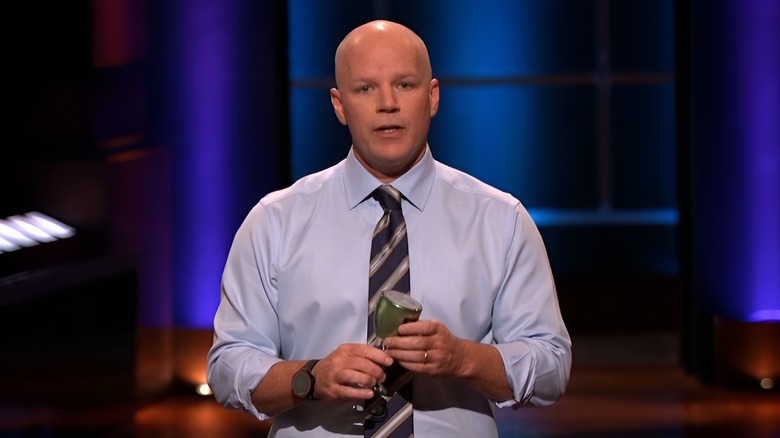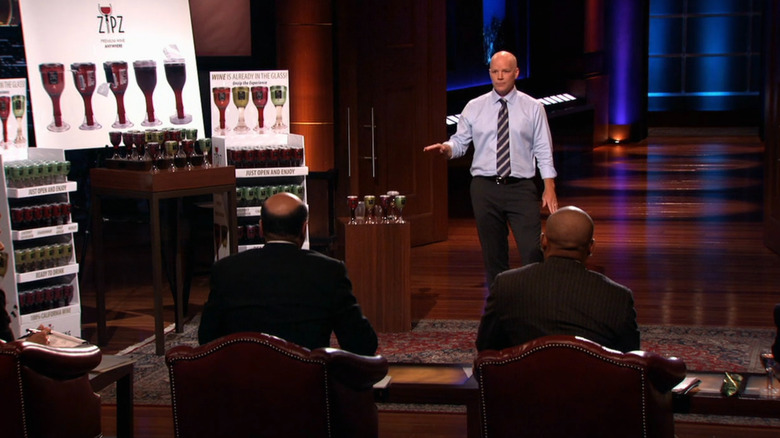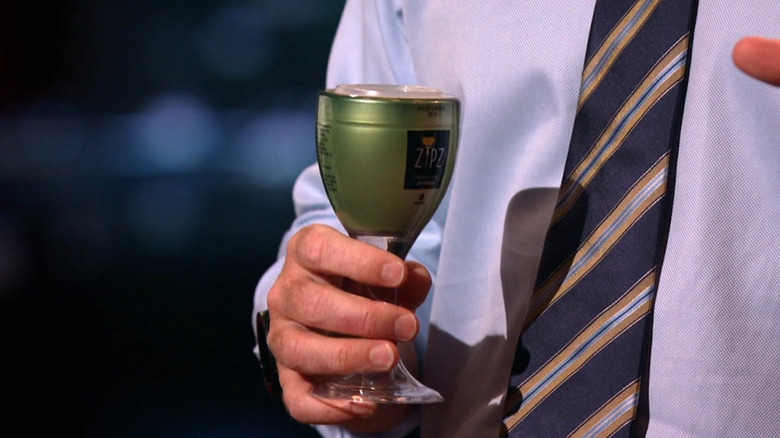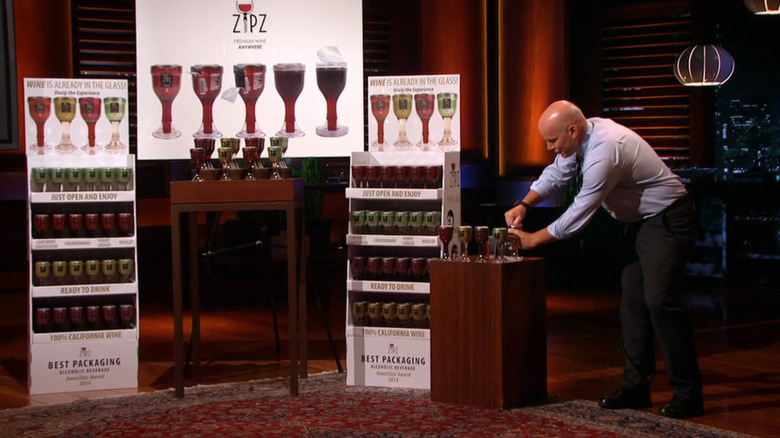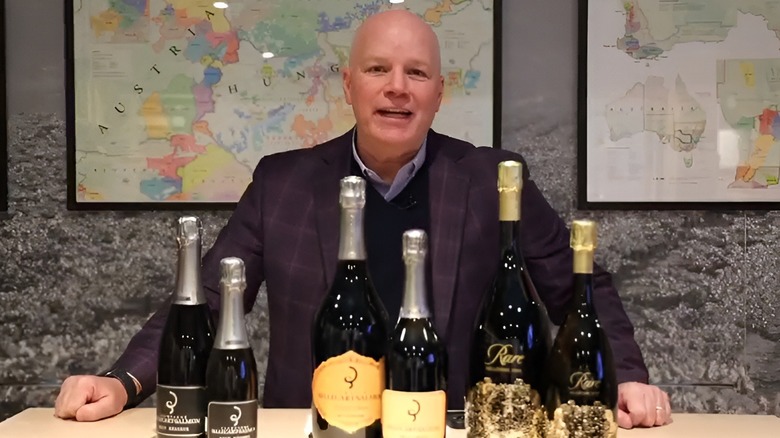Whatever Happened To Zipz Wine After Shark Tank?
Andrew McMurray sought to bring a new experience for wine connoisseurs everywhere with his concept for Zipz Wine, which, as he explained on "Shark Tank," involves prepackaged wine available in a plastic container with a sleek look and feel reminiscent of a true wine glass. Each glass comes with a removable lid that could be attached to the bottom and used as a coaster. The wrapper surrounding the glass acts as a UV protector, giving Zipz a lengthy shelf life of over a year.
Prior to his time on "Shark Tank," McMurray had an extensive history in the wine industry. His father-in-law, Don Zacharia, is the owner of the prestigious New York wine manufacturer, Zachys. Having worked in marketing for most of his life, McMurray was initially hesitant to jump into the profession when Zacharia offered him the chance to work with him. However, after working at the wine store in Los Angeles for some time, McMurray fell in love with the field.
A food-and-wine consultant later approached McMurray with the dilemma of finding an esteemed way of presenting single-serve wine. Finding inspiration from a brand in New Zealand, McMurray teamed up with a designer to execute what would eventually become Zipz Wine. At first glance, Zipz Wine may sound like a similar concept to James Martin's Copa di Vino. But McMurray entered "Shark Tank" with hopes of his presentation going better than the disastrous two-time Copa di Vino pitch from Seasons 2 and 3.
What happened to Zipz Wine on Shark Tank?
Season 6 of "Shark Tank" saw Andrew McMurray seek a $2.5 million investment for 10% of Zipz Wine. Kevin O'Leary's interest is piqued when McMurray mentions the licensing and packaging potential of the business. However, O'Leary is worried that Zipz might get in trouble for breaching Copa di Vino's patents, to which McMurray ensures that Zipz's lengthy shelf life and exterior packaging are what makes it proprietary.
The team is currently in the shelf-life testing phase with three major wine brands, one of them being Yellowtail. At this point, Zipz is 16 months old and its biggest deal was a $130,000 licensing agreement with Fetzer Winery to get its glasses into six major baseball leagues in 2013. Zipz also has its own wine brand, which is available in 1,200 stores and has made $650,000 in total sales. However, the $2.99 price point is cause for concern for O'Leary. He doesn't believe most people will purchase a single-serve glass for that much. The highly opinionated shark reveals that he's had his own hurdles getting a deal with Costco for similar issues.
Most of the sharks back out. They largely like the product and the packaging, but are hung up on the risky valuation, with many of them thinking it'd be best to keep it as a pure licensing deal. O'Leary is willing to give the exact amount McMurray asks for, contingent that they get into Costco. Additionally, he wants the option to buy another $2.5 million at a $25 million valuation should the company get sold. After a call to his other investors, McMurray takes the deal.
Zipz Wine after Shark Tank
The $2.5 million deal between Kevin O'Leary and Zipz Wine remains one of the biggest deals in "Shark Tank" history. This placed it alongside similarly pricey ventures such as Venngo and Boost Oxygen. The collaboration turned out to be a fruitful one, with O'Leary helping get Andrew McMurray's company in front of airlines, hotels, and retailers alike. "Kevin has the ability to get his calls answered and get the right people at the top to take notice," McMurray said in an interview with Westchester Magazine. "Bottom line: When we need him, he has been very responsive in getting back to us."
Zipz Wine received a follow-up appearance on the "Shark Tank" sister program "Beyond the Tank" in 2016, two years after its initial segment aired in December 2014. At this point, the company is on track to hit $1.8 million by the end of the year but has yet to be profitable. As with many "Shark Tank" businesses, Zipz has a tough time keeping up with the demand. McMurray believes that going to a co-packer will aid in scaling up production.
Meanwhile, O'Leary is concerned not only with the slow growth but also with Zipz potentially tarnishing his own reputation among wine customers. The investor gets his own O'Leary Fine Wines into Zipz glasses and plans to have it served at STK restaurants, which already serve O' Leary's brand. Eventually, McMurray manages to find a co-packer that can deliver two million wine cases a year, along with a new international licensing partner, Arctic Beverage.
Why did Zipz Wine go out of business?
It may seem hard to believe that, despite making steps in the right direction following "Shark Tank," Zipz Wine isn't around anymore, at least not in its prior form. It's unclear as to what exactly went down with the business, but most sources indicate that the heavy competition was ultimately too much to keep up with. On top of this, the company stayed in the same ballpark in sales as it did when first appearing on the show, making roughly $600,000 a year and never achieving full profitability.
As a result, Zipz pivoted to being purely dedicated to packaging and licensing to other brands. But even these efforts have seemed to go defunct. Zipz's Instagram, Facebook, and Twitter pages are still up but have not been updated since 2016. Additionally, its websites have either been taken down or appear to not have been updated for some time. This stagnation has led many sources to deem Zipz Wine out of business, and it's hard to argue with that sentiment.
It seems that many of the sharks were right to have reservations about making a deal. Had Zipz remained a full-on licensing brand from the start, it likely wouldn't have had the production and financial issues it would face down the line and could have thrived in the industry.
What's next for Zipz Wine's founder?
Andrew McMurray may have not hit it out of the park with Zipz Wine, but it hasn't seemed to affect him all that much. According to his LinkedIn, he remains the vice president of Zachys Wine & Liquor, a role he's held on to for 30 years. With such a high position, it's likely that Zipz was never going to be McMurray's only priority, even if the company was still up and running today.
Perhaps because of his association with such a historic "Shark Tank" deal, McMurray has also largely been the face of Zachys in recent years. He is a common presence on Zachys' social media accounts and YouTube channel, where he often introduces new wines and updates on the business. In 2021, the company announced that it would be moving its primary New York location from Scarsdale to Port Chester after being founded nearly 80 years ago. The move took place in early 2022. A second location also exists in Washington, D.C.
